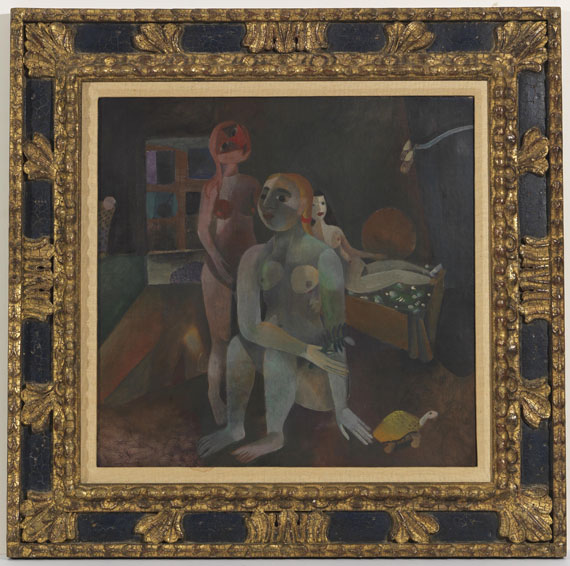Frame image
341
Heinrich Campendonk
Drei Akte mit Schildkröte, Um 1920.
Oil on canvas
Estimate:
€ 200,000 / $ 236,000 Sold:
€ 225,000 / $ 265,500 (incl. surcharge)
341
Heinrich Campendonk
Drei Akte mit Schildkröte, Um 1920.
Oil on canvas
Estimate:
€ 200,000 / $ 236,000 Sold:
€ 225,000 / $ 265,500 (incl. surcharge)
Drei Akte mit Schildkröte. Um 1920.
Oil on canvas, relined.
Firmenich 844. 49.5 x 49.9 cm (19.4 x 19.6 in).
The catalog Ketterer 1971 quotes a confirmation from Adda and Herbert Campendonk: "During the war and the artist's defamation the painting remained hidden. Due to damages to the margins, they were removed and bonded with new canvas in vacuum method". With copy of the original text on the frame.
Characteristic figural work from the early 1920s.
PROVENANCE: Collection Adda Campendonk (until 1971).
Galerie Wolfgang Ketterer, Munich, 6 auction, 6 - 7 December 1971, cat. no. 205 with color illu.
Collection Gore Rifkind, Los Angeles.
Hauswedell und Nolte, Hamburg, 206th auction, 1975, cat. no. 229 with color illu.
Galerie Ambaum, Cologne 1975.
Private collection.
EXHIBITION: 42. Sonderausstellung - Heinrich Campendonk, Kestner Gesellschaft, Hanover 1921, cat. no. 20.
German Expressionist Painting and Sculpture from California Collections, Pasadena Museum of Modern Art, 16 April - 2 June 1974 (with exhibiiton label on frame).
Galerie Ambaum, Cologne 1975, cat. no. 21 with illu.
Galerie Linssen, Bonn 1977, cat. no. 37 with illu.
Ein Maler des Blauen Reiter - Heinrich Campendonk, Kaiser Wilhelm Museum, Krefeld 24 September - 26 November 1989/Städtische Galerie im Lenbachhaus, Munich 13 December 1989 - 18 February 1990, cat. no. 88 with color plate on p. 109.
Heinrich Campendonk, Kunsthalle, Emden 1990.
LITERATURE: Andrea Firmenich, Ein Maler des Blauen Reiter - Heinrich Campendonk, catalog book for the exhbition, Krefeld 1989, p. 94.
Oil on canvas, relined.
Firmenich 844. 49.5 x 49.9 cm (19.4 x 19.6 in).
The catalog Ketterer 1971 quotes a confirmation from Adda and Herbert Campendonk: "During the war and the artist's defamation the painting remained hidden. Due to damages to the margins, they were removed and bonded with new canvas in vacuum method". With copy of the original text on the frame.
Characteristic figural work from the early 1920s.
PROVENANCE: Collection Adda Campendonk (until 1971).
Galerie Wolfgang Ketterer, Munich, 6 auction, 6 - 7 December 1971, cat. no. 205 with color illu.
Collection Gore Rifkind, Los Angeles.
Hauswedell und Nolte, Hamburg, 206th auction, 1975, cat. no. 229 with color illu.
Galerie Ambaum, Cologne 1975.
Private collection.
EXHIBITION: 42. Sonderausstellung - Heinrich Campendonk, Kestner Gesellschaft, Hanover 1921, cat. no. 20.
German Expressionist Painting and Sculpture from California Collections, Pasadena Museum of Modern Art, 16 April - 2 June 1974 (with exhibiiton label on frame).
Galerie Ambaum, Cologne 1975, cat. no. 21 with illu.
Galerie Linssen, Bonn 1977, cat. no. 37 with illu.
Ein Maler des Blauen Reiter - Heinrich Campendonk, Kaiser Wilhelm Museum, Krefeld 24 September - 26 November 1989/Städtische Galerie im Lenbachhaus, Munich 13 December 1989 - 18 February 1990, cat. no. 88 with color plate on p. 109.
Heinrich Campendonk, Kunsthalle, Emden 1990.
LITERATURE: Andrea Firmenich, Ein Maler des Blauen Reiter - Heinrich Campendonk, catalog book for the exhbition, Krefeld 1989, p. 94.
Based on late-impressionism, Heinrich Campendonk detached himself from traditional painting at an early point, owed to his participation in the "Blauer Reiter" he attained a style, which, influenced by a lot of sources, found expression in an almost naive, schematic-surreal manner. Three female nudes in an interior and a turtle going astray offer sufficient reason for interpretation. Campendonk's imagery is full of mystery and opens up a whole new perspective. The turtle, symbol of a long life, is about to go away, while the nudes remain in a kind of rigor without any communication between them. It is a waiting for something, for an event that cannot be predicted from what can be seen. The colors of the three female nudes are also an interesting aspect: the front nude in shades of green, the standing nude in pink and the small reclined nude in a pale blue. As far as the composition is concerned, the triad forms a classic entity that we know from Renaissance, however, the lack of relation between them is an aspect that opens up a new dimension. In those days Heinrich Campendonk was quite impressed by the art of Henri Rousseau, who had made the naive-creatural subject of his art. In reminiscence of the almanac "Der Blaue Reiter", which pays particular homage to the works of Henri Rousseau, this painting offered here also comes to mind, with its mysterious content it remains a challenge and as far as the artistic interpretation is concerned it counts among the best works by Campendonk from these days.
Headquarters
Joseph-Wild-Str. 18
81829 Munich
Phone: +49 89 55 244-0
Fax: +49 89 55 244-177
info@kettererkunst.de
Louisa von Saucken / Undine Schleifer
Holstenwall 5
20355 Hamburg
Phone: +49 40 37 49 61-0
Fax: +49 40 37 49 61-66
infohamburg@kettererkunst.de
Dr. Simone Wiechers / Nane Schlage
Fasanenstr. 70
10719 Berlin
Phone: +49 30 88 67 53-63
Fax: +49 30 88 67 56-43
infoberlin@kettererkunst.de
Cordula Lichtenberg
Gertrudenstraße 24-28
50667 Cologne
Phone: +49 221 510 908-15
infokoeln@kettererkunst.de
Hessen
Rhineland-Palatinate
Miriam Heß
Phone: +49 62 21 58 80-038
Fax: +49 62 21 58 80-595
infoheidelberg@kettererkunst.de
We will inform you in time.





